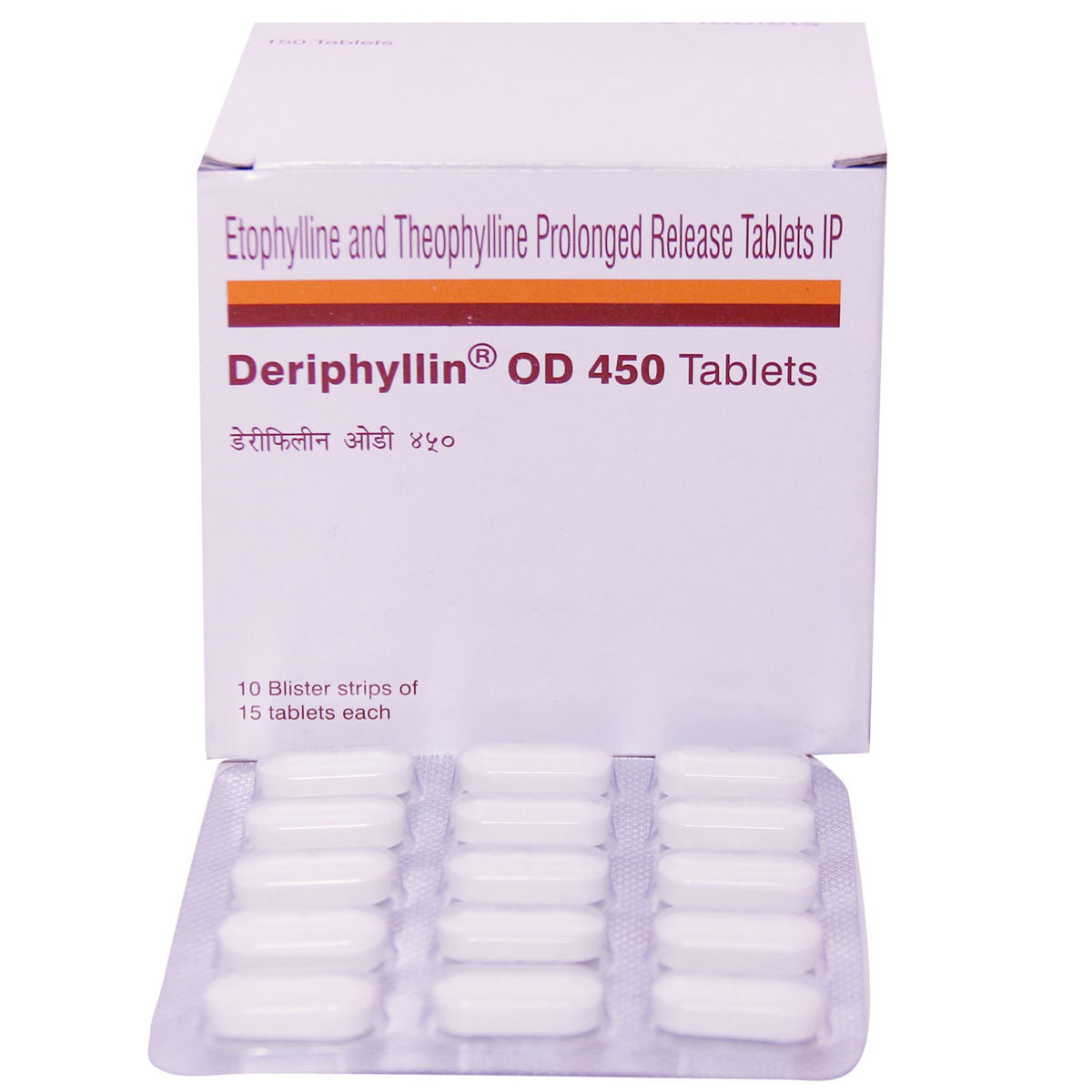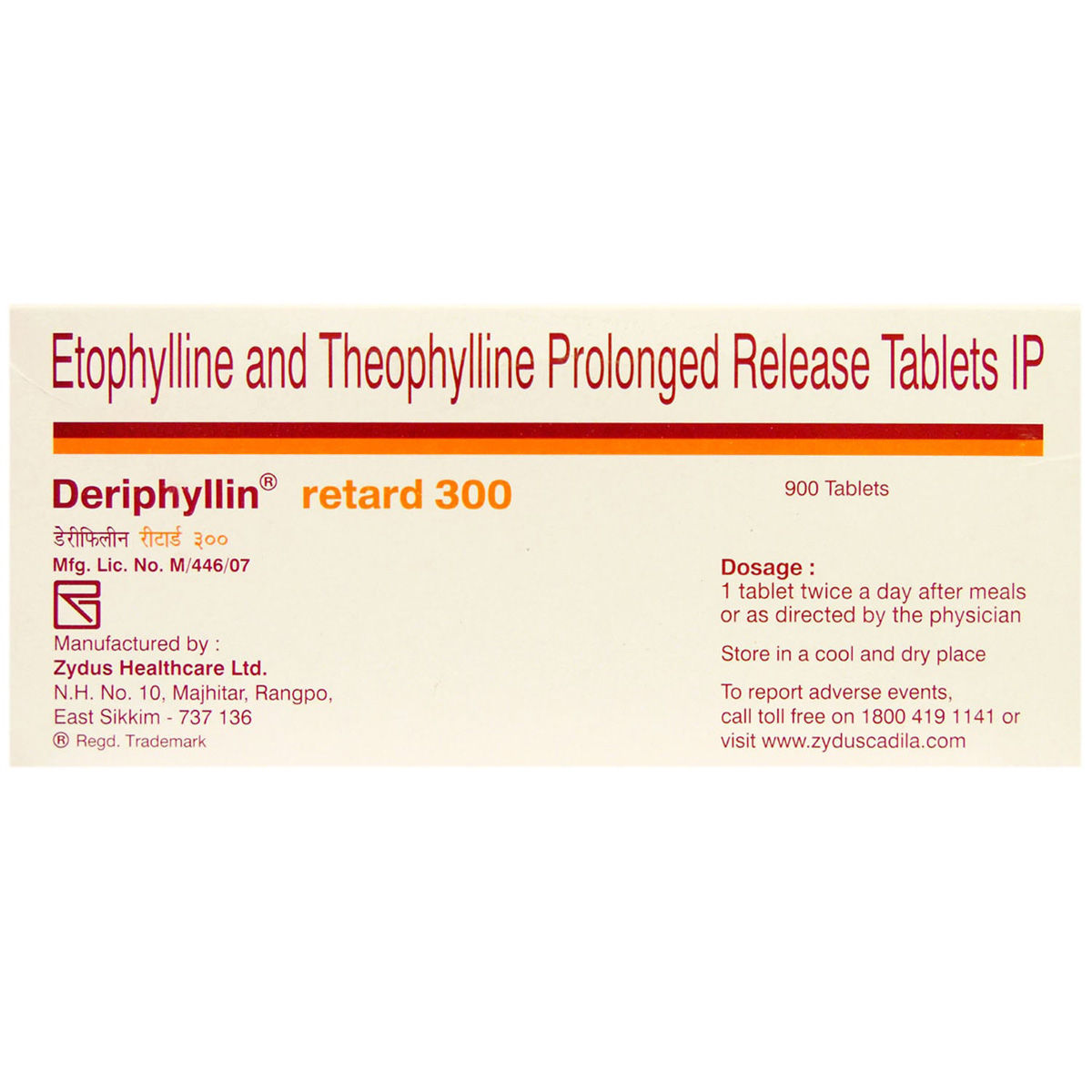Theophylline+etofylline Nicotinate
About Theophylline+etofylline Nicotinate
Theophylline+etofylline Nicotinate belongs to a group of medications 'Xanthines', primarily indicated to treat Asthma symptoms and chronic obstructive pulmonary disease (COPD). Asthma is a respiratory disease in which the lungs' airways get inflamed due to which a person finds difficulty in breathing and doing normal physical activities. COPD is a chronic inflammatory disease of the lungs that blocks the lungs' airways, which is followed by emphysema and chronic bronchitis. Emphysema gradually destroys the air sacs of the lungs and created difficulty in outward airflow. At the same time, bronchitis causes narrowing and inflammation of bronchial tubes, which results in the overproduction of mucus.
Theophylline+etofylline Nicotinate compromises of Theophylline and Etofylline Nicotinate, which relieves breathlessness by relaxing muscles of airways so that a person can easily inhale or exhale (breath). Theophylline+etofylline Nicotinate also decreases the lungs' response against irritants that control the symptoms of breathing problems and thus allows a person to live a normal life.
Take Theophylline+etofylline Nicotinate as prescribed. Your doctor will recommend you how often you take Theophylline+etofylline Nicotinate based on your medical condition. A person taking Theophylline+etofylline Nicotinate may experience headaches, irritability, restlessness, sleeplessness, difficulty sleeping, and falling asleep. Some of the unpleasant effects do not require the doctor's attention; however, one should report to the doctor if the side effects continue or worsen.
Never try to increase the dose or for a longer duration to get the desired results fast. It may lead to an overdose of medication that can cause severe side effects, including seizure, slow heart rate, nausea, and vomiting. Before taking Theophylline+etofylline Nicotinate, one should tell the doctor if they have a peptic ulcer, sepsis, liver or kidney disease, seizures, fluid in the lungs, heart problems, and a thyroid disorder. Theophylline+etofylline Nicotinate can not be advised in these conditions. This is a habit-forming drug that can increase drug dependence, so one should consult with their doctor before stopping it directly as the doctor will suggest lowering the dose before stopping it directly.
Uses of Theophylline+etofylline Nicotinate
Medicinal Benefits
Theophylline+etofylline Nicotinate consists of Theophylline and Etofylline nicotinate as its active ingredient which falls into a category of drugs known as bronchodilators. Theophylline+etofylline Nicotinate is useful in treating asthma and chronic obstructive pulmonary disease (COPD). It works by easing respiratory disease symptoms such as breathlessness and wheezing by relaxing the airways' muscles to open up and make it easier to breathe easily. These medicines also reduce the swelling in the lungs and tightness of the chest in asthmatic patients.
Directions for Use
Storage
Side Effects of Theophylline+etofylline Nicotinate
- Feeling sick
- Headache
- Vomiting
- Abdominal pain
- Diarrhoea
- Difficulty sleeping
- Anxiety
- Dizziness
Drug Warnings
The use of Theophylline+etofylline Nicotinate is restricted in patients dealing with a peptic ulcer, a thyroid disorder, liver disease, kidney disease, sepsis, fluid in the lungs, heart problems, seizures so tell the doctor if you ever had any of the diseases. Theophylline+etofylline Nicotinate can not be used in pregnancy or breastfeeding women unless specified by the doctor. This is not a rescue treatment for asthma attacks, so use methods that work quickly like inhalation medicine. Theophylline+etofylline Nicotinate can affect the result of certain tests so one should tell their doctor before going for any medical test. A person should not stop or start Theophylline+etofylline Nicotinate without consulting with their doctor as smoking affects how his medicine works so the doctor will initially suggest the low dose.
Drug Interactions
Drug-Drug Interactions: A person should always tell their doctor about the medicines they are taking as there is possible drugs interaction that includes anti-asthmatic medications (salbutamol, terbutaline, aminophylline, or salmeterol ) high blood pressure medicine (adenosine, isoprenaline, mexiletine, propranolol, verapamil), antibiotics ( erythromycin, norfloxacin), anticancer medicines(aminoglutethimide, methotrexate) and treats alcoholism (disulfiram).
Drug-Food Interactions: Foods containing caffeine, sodium, or alcohol should be avoided while taking Theophylline+etofylline Nicotinate as it may affect the working action of Theophylline+etofylline Nicotinate.
Drug-Disease Interactions: a person should tell their medical history to the doctor as Theophylline+etofylline Nicotinate should be used with caution if a person has overactive thyroid gland (hyperthyroidism), stomach ulcer, liver problems, seizures (fits) or convulsions, fever, viral infection, high blood pressure or any other heart problems, alcoholism, male and have difficulty in passing urine.
Drug-Drug Interactions Checker List:
Safety Advice

Alcohol
cautionOne should limit alcohol consumption and tell their doctor if they drink as the doctor will suggest a lower dose of Theophylline+etofylline Nicotinate. Additionally, it has been seen as a person who doesn't drink responds better to the treatment.

Pregnancy
cautionThe use of Theophylline+etofylline Nicotinate in pregnancy is only allowed if prescribed by the doctor as studies are still going on to know if this medication affects the unborn baby or not.

Breast Feeding
cautionThe use of Theophylline+etofylline Nicotinate in breastfeeding is only allowed if prescribed by the doctor as studies are still going on to know if this medication passes into breast milk or not.

Driving
cautionA person should avoid driving after taking Theophylline+etofylline Nicotinate may affect a person's thinking ability, so do not drive or do any work that needs mental alertness.

Liver
cautionThe use of Theophylline+etofylline Nicotinate in liver disorders is only allowed if prescribed by the doctor.

Kidney
cautionThe use of Theophylline+etofylline Nicotinate in kidney disorders or impaired renal disorders is only allowed if prescribed by the doctor.

Children
safe if prescribedTheophylline+etofylline Nicotinate is safe to use in children if prescribe d by the doctor.
Habit Forming
Diet & Lifestyle Advise
- A person dealing with asthma and COPD need to maintain a healthy weight as excessive weight may worsen the symptoms. Even losing some pounds may help in improving the symptoms.
- Try to eat a lot of fruits and vegetables that are a good source of antioxidants and reduce the inflammation or swelling of the lungs.
- Include foods high in Vitamin D in your diet like eggs, fish, and sun exposure can improve asthma symptoms.
- A person should avoid long-stored food containing sulfites such as pickle, and fresh and frozen shrimp as sulfites can trigger asthma attacks.
- It is advised to consume less sodium or salt and eat foods high in nuts and seeds (omega-3 fatty acids) to improve the symptoms.
- One should avoid exposure to allergens that can trigger the asthma attacks like going in grassy fields etc. The doctor may suggest to warm up for 10 minutes before exercising and walking or low-intensity activities.
Special Advise
The doctor may suggest some tests to know the root cause of respiratory disorder such a Spirometry( check the narrowing of bronchial tubes) and Peak flow (check how difficult is to exhale)
Patients Concern
Disease/Condition Glossary
Asthma: It is a long-term inflammatory disease of the lungs' airways that causes difficulty in breathing and daily tasks. It is a chronic disease that affects the airways which supply oxygen to the lungs. When these airways become inflamed or irritated, then it starts showing asthmatic symptoms. The most commonly reported signs of asthma are whistling sound during breathing, wheezing, coughing that worsen during night, laughing or exercising, shortness of breath, tightness in the chest, anxiety, and fatigue.
COPD: Chronic obstructive pulmonary disease is a group of progressive lung diseases that include emphysema and chronic bronchitis. Some of the patients even face both conditions. In Emphysema, the lungs' surface gets slowly destroyed, which affects the outward flow of air. In Bronchitis, excessive mucus gets accumulated in bronchial tubes which causes inflammation of airways. This disease slowly damaged the lungs and clogged them with mucus. The primary symptoms of COPD include difficulty breathing, wheezing, excessive mucus production, and chest tightness. The other symptoms include chronic cough, shortness of breath even after walking, frequent colds, flu, fatigue.
FAQs
Theophylline+etofylline Nicotinate is used to treat Asthma symptoms and chronic obstructive pulmonary disease (COPD).
When a person takes Theophylline+etofylline Nicotinate, it opens up their airways by relaxing the muscles, so the airflow becomes normal, and a person can breathe easily.
Theophylline+etofylline Nicotinate is not suitable for everyone, especially those who are allergic to it or have certain medical conditions such as kidney/ heart/ liver disorders, peptic ulcers, seizures, and thyroid disorder. So, one should tell their doctor if they have any of these diseases.
Like other medications, Theophylline+etofylline Nicotinate may cause certain side effects that can be weight. However, not every person faces such side effects, but weight loss is reported in some patients.
Over time, Theophylline+etofylline Nicotinate may become unsuitable for some persons even if it is suitable in the past. Talk to your doctor if you are noticing any improvement in your condition.
Avoid foods that are high in caffeine such as tea, coffee, chocolate, and cola as this food already consists of theophylline, an active constituent of Theophylline+etofylline Nicotinate. So, taking it more worsen the side effects so tell your doctor they will adjust the dose and suggest avoiding these foods.
Theophylline+etofylline Nicotinate is a short-acting medicine that stops working within 24 hours so one should take the next dose if it's the time of the other dose.






